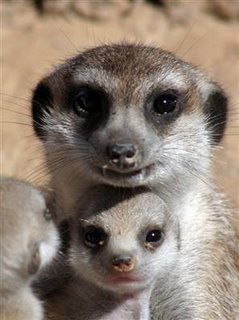 Just a curious news story, but if it is such an exciting thing to find Meerkats "homeschooling" why can't we be left in peace to do it as well? The article points out the difference between an animal learning by observation which is rather passive on the part of the adult, and learning by teaching in which the adult takes an active role, scaling instruction to meet the needs of the youngster.
Just a curious news story, but if it is such an exciting thing to find Meerkats "homeschooling" why can't we be left in peace to do it as well? The article points out the difference between an animal learning by observation which is rather passive on the part of the adult, and learning by teaching in which the adult takes an active role, scaling instruction to meet the needs of the youngster."For example, if a chimpanzee infant sees his mother probing for termites using a stick and later finds the stick his mother used, tries it out himself and learns how to fish for ants, there is no element of teaching involved," [Alex Thornton] explained. MSNBCLikewise, it seems, if a mother drops her child off at daycare at six where he is shuttled to and from school and mom picks him up again at 6PM, there is little teaching going on. However, by observation, the young human learns quite a bit about his status in his parents' world.
Of course, evolution has to be brought into the discussion somewhere.
"A greater understanding of the evolution of teaching is essential if we are to further our knowledge of human cultural evolution and for us to examine the relations between culture in our own species and cultural behavior in other animals," Alex Thornton said in a statement. MSNBCJust out of curiousity, what "cultural behavior" do we observe in animals? I was surprised to find that there is not really one accepted definition of culture. It seems a rather intangible concept, but this one seems to generally reflect the norm among what I was able to find:
The totality of socially transmitted behavior patterns, arts, beliefs, institutions, and all other products of human work and thought.Human work and thought. That means that animals cannot have it.
Interesting, at leat to me, is how modern the concept of culture even is. Until 1867, culture was viewed as a very intentional thing. At first, it dealt directly with the tilling of the land. In the 1500s it took on the sense of "cultivation through education." In 1805, we see it used to describe "the intellectual side of civilization," and in 1867, we finally see culture emerge as "collective customs and achievements of a people." That is when it suddenly became "socially transmitted" rather than considered, studied and adopted.
Other notable events of 1867:
Karl Marx publishes Das Kapital.
Paleontologist Edward Drinker Kope proposes an alternate mechanism driving evolution, besides natural selection.
Alfred Nobel patents dynamite.
Augustin Daly's play, Under the Gaslight appears, in which the heroine rescues the hero.
Congress creates the Department of Education.
It seems the time was ripe for the beginnings of the socialization question, also known as enculturation. In fact, the term "socialize" meaning "process of making social" is from 1840.
So, should humans teach their children through passive observation (socialization) or active teaching? In other words, do we want to cultivate their minds or enculturate them?
On a lighter note, The Carnival of Kid Comedy is up with a nice selection of kids being kids.
socialization, homeschooling, home school, culture, parenting
